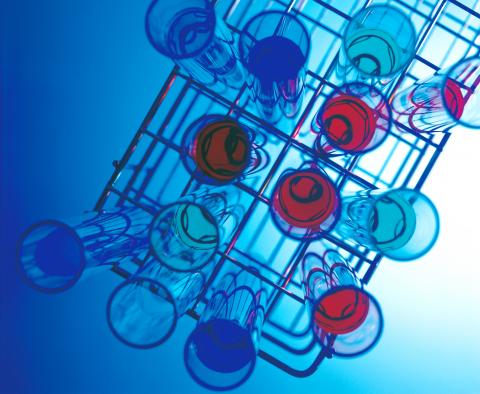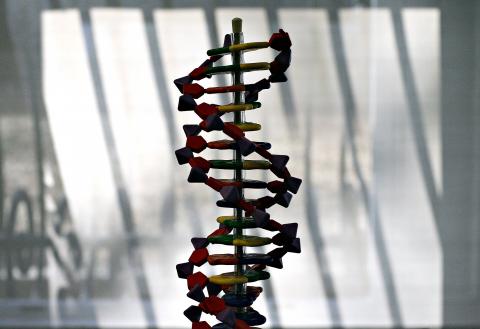As a taxi takes me across Madrid to the laboratories of Spain’s National Cancer Research Center, I am fretting about the future. I am one of the first people in the world to provide a blood sample for a new test, which has been variously described as a predictor of how long I will live, a waste of time or a handy indicator of how well (or badly) my body is aging. Today I get the results.
Some newspapers, to the dismay of the scientists involved, have gleefully announced that the test, which measures the telomeres (the protective caps) on the ends of my chromosomes, can predict when I will die. Am I about to find out that, at least statistically, my days are numbered? And, if so, might new telomere research suggesting we can turn back the hands of the body’s clock and make ourselves “biologically younger” come to my rescue?
The test is based on the idea that biological aging grinds at your telomeres. And, although time ticks by uniformly, our bodies age at different rates. Genes, environment and our own personal habits all play a part in that process. A peek at your telomeres is an indicator of how you are doing. Essentially, they tell you whether you have become biologically younger or older than other people born at around the same time.

Photo: Taipei Times
The key measure, explains Maria Blasco, a 45-year-old molecular biologist, head of Spain’s cancer research center and one of the world’s leading telomere researchers, is the number of short telomeres. Blasco, who is also one of the cofounders of the Life Length company which is offering the tests, says that short telomeres do not just provide evidence of aging. They also cause it. Often compared to the plastic caps on a shoelace, there is a critical level at which the fraying becomes irreversible and triggers cell death. “Short telomeres are causal of disease because when they are below a [certain] length they are damaging for the cells. The stem cells of our tissues do not regenerate and then we have aging of the tissues,” she explains. That, in a cellular nutshell, is how aging works. Eventually, so many of our telomeres are short that some key part of our body may stop working.
The research is still in its early days but extreme stress, for example, has been linked to telomere shortening. I think back to a recent working day that took in three countries, three news stories, two international flights, a public lecture and very little sleep. Reasonable behavior, perhaps, for someone in their 30s — but I am closer to my 50s. Do days like that shorten my expected, or real, lifespan?
People with similar worries — or, perhaps, just Woody Allen-style neuroses about their health — have begun to contact the company set up by Blasco. Requests have poured in from around the world since a headline writer at the London-based Independent, perhaps misled by Life Length’s ambiguous name, invited readers to find out about “The £400 (US$630) test that tells you how long you’ll live.” The Internet did the rest.

Photo: Bloomberg
Originally set up to help researchers and the pharmaceutical, health food and cosmetics industries test the impact of their products on telomeres, the flood of individual requests has caught Blasco’s still tiny company by surprise. But the test is available, as of this month, via doctors in Spain and Portugal and there are plans to make it easier to carry out in the UK and the US as soon as possible. It sees a potential gold mine in testing of what it calls people’s “biological age” — though it is by no means alone in the field. So what can Blasco tell me about my test?
“You actually have very good news,” she says, pointing at a chart that looks as if it has been blasted by shotgun pellets. My telomeres — especially the more dangerous, shortest ones — are in better shape than would be normal for my age. The pellet points are individual results from those people who have been tested and introduced into this database so far, and the red dot representing my blood sample is on the better side of the two graphs Blasco shows me. One graph shows median telomere length, while the other shows how many crucially short telomere endings I have. In each case, a line on the graph shows the average result against age. The test on some 100,000 of my telomeres, compared with the other results on the admittedly small database being used by Life Length when this test was done in the summer, give me a “biological age” six years below my real age. With only 90 other men on the chart so far, all with different lifestyles and genetic backgrounds to mine, I should avoid feeling smug. Eventually, when there are thousands or more on the database, I might get a better idea of what results people more like me should expect. I have a reasonably healthy lifestyle, after all, and previous generations on both sides of my family have been long-lived.
However, according to a New York Times interview with 2009 Nobel prize-winner Carol Greider — who Blasco trained under — individual telomere tests are not much use. “The science really isn’t there to tell us what the consequences are of your telomere length,” she said.
Blasco, obviously, disagrees. So does Elizabeth Blackburn, who shared the Nobel prize for telomere research with Greider and Jack Szostak, and has set up her own Telome Health company to start offering tests later this year.
Blasco compares the current state of telomere testing to the early days of cholesterol tests — and believes it should become common once the price drops and research is done to beef up databases, improve interpretation and create telomere-restoring treatments. “This is a different kind of marker. It is a new, molecular marker. Even though we measure telomere length in blood cells, it has been shown to be an indicator of the degree of telomere shortening in the whole organism,” she says. “And we think it is very powerful, based on what we know from hard science.” Even so, she is insistent that the test is not a magic measure of individual life length. “We don’t tell anyone how long they will live.
“It is the doctor — and we want to do this with doctors — who will tell you what is known about the meaning of this measurement and what you can do and what you cannot do,” says Blasco. In fact, the benefits of telomere science still lie mostly in the future. As with early cholesterol tests, a doctor is currently unable to tell you much about what those results mean — or what you can do about a bad result, beyond fairly obvious advice about looking after your health.
I notice that a few of the 90 men on my chart have apparently alarming results. Their telomeres indicate a “biological age” 20 years or more higher than their real age. This means that, at least statistically, they may be much closer to death than most people their age. One of these men comes from a family with a long history of early cancers, according to Life Length’s CEO Stephen Matlin. He has offered those with worryingly high results a free second test after three months, to see whether anything has changed. My report also warns, however, that results may reflect temporary illness or ongoing medical treatments — effectively skewing them. And some results on the chart look plain bizarre. One tester, for example, appears to have — at least statistically — a biological age of around 120. Two people aged above 60, together with a clutch of 30-year-olds, have an estimated biological age below zero — presumably because their telomeres are in better shape than might be expected of the average baby. Life Length said this reflected the fact that little research had been done on the telomeres of the very young.
Individual testing, then, is still in nappies. Far more exciting are the possible future advances to come from telomere research, says Blasco. “One is telomerase activation, because of its potential to reverse aging. And proving which diseases can benefit from telomerase activation, in order for this to be something druggable.”
“Some of the new [research] papers appearing in top journals are to do with telomorase activation,” she says. “That is one aspect. The other is that we are seeing a lot of epidemiological studies showing correlations between telomere length and certain diseases, and which habits are good or bad for telomere length.”
She says the idea that telomeres can be
“re-elongated” and, hence, that biological age can be reversed does not open the door to immortality — even if scientists have been able to extend a mouse’s age by up to 40 percent. “That’s a lot, but nobody has been able to make a mouse that is immortal,” she says.
It does, however, throw up philosophical and ethical dilemmas. The US Food and Drug Administration, for example, refuses to approve drugs that are simply designed to prevent aging. “Although I — and many more scientists — believe aging is the cause of diseases, this is not perceived like that yet by the Food and Drug Administration,” says Blasco. “But what is clear is that there are a number of diseases associated with aging which are caused because our cells age.”
Activating telomerase to counter that, she says, might help prevent major illnesses and allow drugs to be approved by the Food and Drug Administration. If drugs are found to activate telomerase and prevent, say, Parkinson’s disease, Alzheimer’s disease or some cardiovascular problems then the inevitable result will be not just a healthier life, but also a longer one.
Blackburn agrees that the idea that the new tests can tell you your life length is silly, but she insists that the evidence connecting telomere length and disease risk is becoming clearer.
“We and other groups are seeing clear statistical links between telomere shortness and risk for a variety of diseases that are becoming very common, such as cardiovascular disease, diabetes and certain cancers,” she told the nature.com Web site in August. “We have also looked at chronic psychological stress, including depression and post-traumatic stress disorder, and more and more we see associations with telomere shortness. There are even links with education — in one study telomere shortness was related to not finishing school. We’re seeing the data unfolding in front of us. A lot of them are not published yet.”
So what has telomere testing done for me? Not a lot, frankly, though I might have reacted differently had I been dangerously off the chart. Nor am I a woman in her 30s, who might like to know how fast the biological clock that may eventually limit fertility is ticking.
I am tempted to repeat the test again, mainly out of a competitive desire to get better, but only if (as on this occasion, when Life Length waived the fee) I can get it for free. Far more interesting, however, has been the glimpse of the future — when telomere testing, and popping pills to repair the tips of our chromosomes, may allow us to live both longer and healthier. I am persuaded, too, that the aim should be to make sure we live our years out in good health. So why all the rushing about? Time, perhaps, to take things more calmly.

In late October of 1873 the government of Japan decided against sending a military expedition to Korea to force that nation to open trade relations. Across the government supporters of the expedition resigned immediately. The spectacle of revolt by disaffected samurai began to loom over Japanese politics. In January of 1874 disaffected samurai attacked a senior minister in Tokyo. A month later, a group of pro-Korea expedition and anti-foreign elements from Saga prefecture in Kyushu revolted, driven in part by high food prices stemming from poor harvests. Their leader, according to Edward Drea’s classic Japan’s Imperial Army, was a samurai

The following three paragraphs are just some of what the local Chinese-language press is reporting on breathlessly and following every twist and turn with the eagerness of a soap opera fan. For many English-language readers, it probably comes across as incomprehensibly opaque, so bear with me briefly dear reader: To the surprise of many, former pop singer and Democratic Progressive Party (DPP) ex-lawmaker Yu Tien (余天) of the Taiwan Normal Country Promotion Association (TNCPA) at the last minute dropped out of the running for committee chair of the DPP’s New Taipei City chapter, paving the way for DPP legislator Su

It’s hard to know where to begin with Mark Tovell’s Taiwan: Roads Above the Clouds. Having published a travelogue myself, as well as having contributed to several guidebooks, at first glance Tovell’s book appears to inhabit a middle ground — the kind of hard-to-sell nowheresville publishers detest. Leaf through the pages and you’ll find them suffuse with the purple prose best associated with travel literature: “When the sun is low on a warm, clear morning, and with the heat already rising, we stand at the riverside bike path leading south from Sanxia’s old cobble streets.” Hardly the stuff of your

April 22 to April 28 The true identity of the mastermind behind the Demon Gang (魔鬼黨) was undoubtedly on the minds of countless schoolchildren in late 1958. In the days leading up to the big reveal, more than 10,000 guesses were sent to Ta Hwa Publishing Co (大華文化社) for a chance to win prizes. The smash success of the comic series Great Battle Against the Demon Gang (大戰魔鬼黨) came as a surprise to author Yeh Hung-chia (葉宏甲), who had long given up on his dream after being jailed for 10 months in 1947 over political cartoons. Protagonist